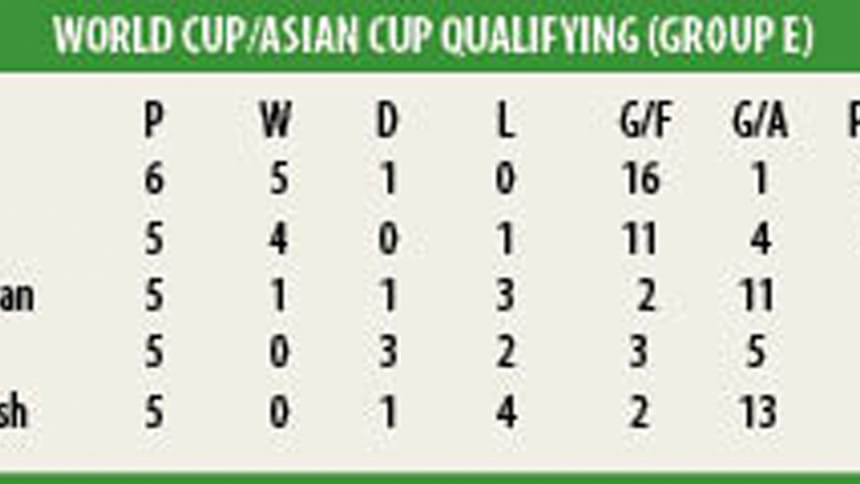With better planning and prep, things can only get better

Following the 5-0 defeat against Qatar in a World Cup qualifying fixture in Doha on Friday night, Bangladesh coach Jamie Day was quick to emphasise that the margin of defeat, despite it being the biggest of his tenure, was not an unexpected one. Instead, the coach wanted to take the positives from the match while looking forward to what comes next.

"We'll take the positives out of today's game and we're looking forward to the next year when we play the next three games," the coach said in his post-match reaction after heaping praise on young goalkeeper Anisur Rahman Zico and the overall discipline and organisation of the team.
If we move away from the scoreline and the gulf in statistics of the two teams in this match, there is reason to be optimistic about, especially if we focus on how things were at this stage five years ago.
In the eight matches in the previous edition of the qualifiers, Bangladesh had conceded a grand total of 32 goals against two scored, with only a single point in the bag. This time with five matches gone, four of which were away matches, Bangladesh have conceded only 13 goals against two scored. Although the men in red and green have not shown any considerable improvement in scoring goals, defensively they have been far better these days.
The defeat against Qatar may have officially ended Bangladesh's World Cup qualification chances, but they are still very much in the race for qualification for the Asian Cup in 2023 despite being bottom of Group E with a single point. The reason is that the other two teams in the group -- India and Afghanistan -- are within knocking distance.
India are just two points ahead of Bangladesh and Afghanistan only three. Bangladesh will host both these countries as well as Oman in their three remaining matches between March and June 2021. Judging by the previous performances against those two South Asian teams – a 1-0 defeat against Afghanistan in Dushanbe and a 1-1 draw against India in Kolkata -- positive results in those matches are not unachievable.
But to achieve positive results, there needs to be proper planning and preparation, something which was not there for the Qatar match. The coach had always said that five weeks' training and practice matches against Nepal or those against lower-tier Qatari clubs were not ideal preparation. Now Bangladesh Football Federation president Kazi Salahuddin seems to have weighed in on those views.
Talking to reporters at the BFF office yesterday, Salahuddin said he would try to convince clubs to release players one month before the next qualifying matches as he felt 10 days' preparation was not enough. He also said that he would do his best to ensure Bangladesh play against 'superior teams like Malaysia and Thailand' before facing India and Afghanistan.
With at least three months before the next qualifying fixture, the players should get back to full fitness through domestic competition and the team should be bolstered by the return of a number of key players who were missing from the game against Qatar due to injury.
If the coach's wishes are realised and the president's words are reflected in action, there is no reason not to believe that the worst of the qualifying campaign is over and things can only get better from here.

 For all latest news, follow The Daily Star's Google News channel.
For all latest news, follow The Daily Star's Google News channel. 



Comments